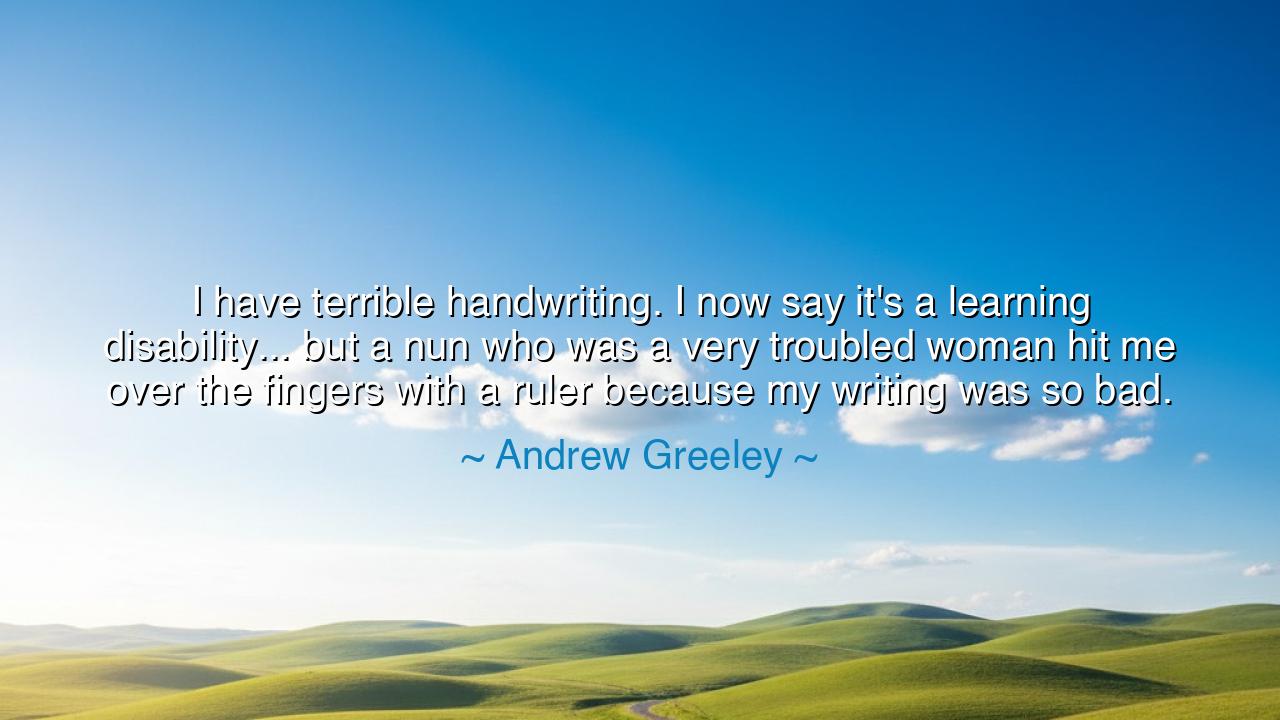
I have terrible handwriting. I now say it's a learning
I have terrible handwriting. I now say it's a learning disability... but a nun who was a very troubled woman hit me over the fingers with a ruler because my writing was so bad.






In the dim schoolroom of memory, Andrew Greeley names his wound without bitterness: “I have terrible handwriting. I now say it’s a learning disability… but a nun, who was a very troubled woman, hit me over the fingers with a ruler because my writing was so bad.” Hear how this confession carries two histories at once: the private history of a child whose hand could not obey the line, and the public history of a pedagogy that mistook struggle for disobedience. The rod fell where insight should have fallen; pain was given where patience was owed. In that small scene, the old world speaks—where conformity was prized above comprehension, and the body was corrected when the brain needed understanding.
What is terrible handwriting but the outer weather of an inner climate? The hand is a servant to the mind’s pathways, and some paths wander through fog. To call it a learning disability—to give it a name like dysgraphia—is not to claim weakness, but to place the trouble on the map where aid may find it. The ancients taught that wisdom begins by naming things truly. In this naming, shame loosens its grip. The learner becomes not a culprit but a traveler, not a failure but a wayfarer with different gear.
The ruler across the knuckles is a crude sacrament of a bygone creed: that discipline cures what discernment does not bother to diagnose. But correction without comprehension is a hammer searching for a keyhole. The blow instructs the hand to fear, not to form; it teaches silence, not script. Thus a child may learn to tremble before the page while the miracle of language—its music and reach—remains locked just beyond the pain. The body remembers the lash long after the lesson is forgotten.
Let us light a lamp from history. In the nineteenth century, Horace Mann—called the father of the common school—traveled among classrooms where the rod was law and recitation the only proof of learning. He argued, with a prophet’s urgency, that schools must trade punishment for pedagogy, that the teacher’s first tool is understanding, not force. His reports helped bend policy toward gentler methods and richer curricula. Though imperfect and incomplete, this turn taught a nation that the mind is not a battlefield for conquest but a garden for cultivation. From that soil, later reformers—Montessori, Dewey, and many others—would grow practices that honor the varied ways children learn.
Consider also a quieter story from our own age. A boy—call him Elias—cannot hold his letters steady. The lines drift; the curves collapse. Once, he hid his hands behind his back when the worksheet approached. Then a teacher set aside the ruler and brought out tools: grips, graph paper, speech-to-text, and the patient ritual of occupational therapy. His essays arrived first as spoken rivers, then as typed hills, and finally as handwritten bridges—imperfect, yes, but sturdy enough to cross. What had been labeled “lazy” became known as dysgraphia; what had been punished became supported; what had been a bruise became a voice.
From these stories springs the meaning—and the origin—of Greeley’s saying. The old pain reminds us how easy it is for authority to confuse uniformity with excellence, and how necessary it is for love to enter the classroom as a method. To tell this tale aloud is to lift a warning: do not strike the hand that is already wrestling a hidden load. And it is to offer a blessing: give the learner many doors, and they will find the one that opens inward.
Carry, then, this lesson as if it were written on soft leather and bound to your wrist: name the struggle; refuse the shame; replace force with formative care. If you teach, observe before you judge; test strengths alongside deficits; vary the path, not the destination. If you parent, praise the idea before the ink; allow typing, dictation, and drawing as equal gates to meaning. If you are the learner, claim your right to tools that fit your hand—assistive technology, extra time, practice in small steps—and keep faith with your gifts. And for all of us, let us retire the ruler and lift up the lantern of compassion, so that every trembling hand may become, in time, the hand that writes its own deliverance.






AAdministratorAdministrator
Welcome, honored guests. Please leave a comment, we will respond soon